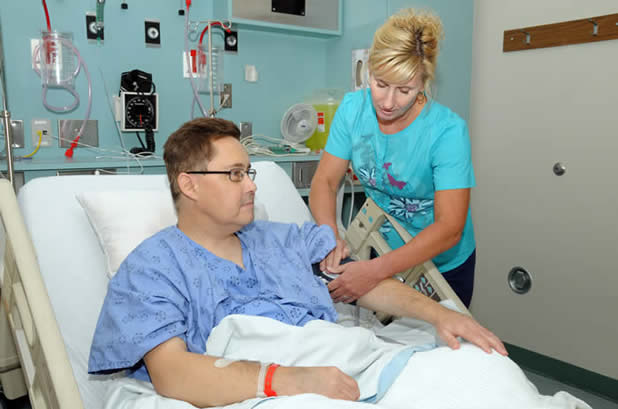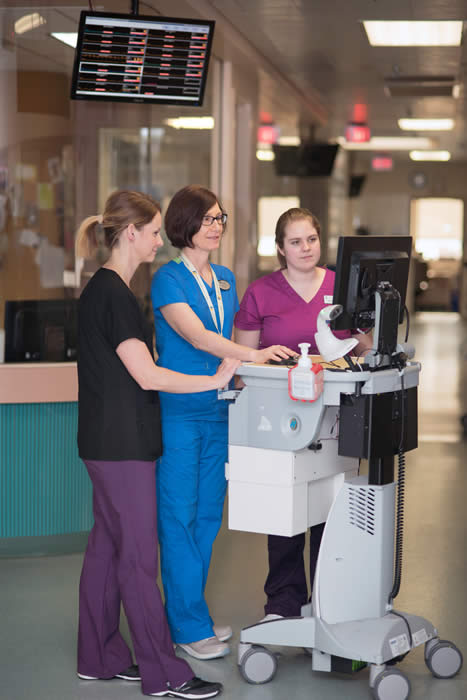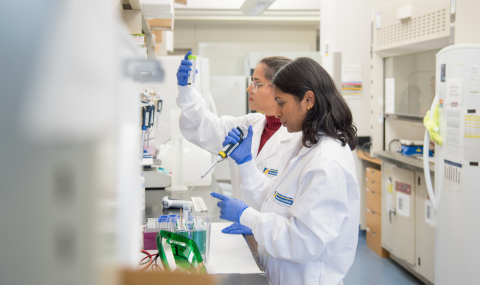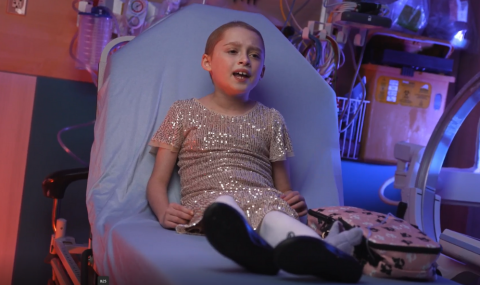Long before patient-centred care was commonplace, the needs of transplant patients, regardless of organ, were identified as unique. The Multi-Organ Transplant Unit, which opened August 31, 1987, was the first unit in Canada designed specifically for treating transplant patients. There are 12 private rooms each equipped with a patient monitoring system and personal hygiene facilities. There is also a comfortable lounge and outdoor garden courtyard for transplant patients and families to enjoy during their stay.
Immediately after transplant surgery, some patients require assistance breathing. As the Multi-Organ Transplant Unit is not equipped with breathing machines, all transplant patients, except kidney and kidney-pancreas recipients, go to the Intensive Care Unit for 24 to 48 hours. Kidney and kidney-pancreas transplant patients have a brief stay in the Post-Anesthetic Care Unit prior to transfer to the Transplant Unit.
On arrival in the Multi-Organ Transplant Unit, patients are cared for by a dedicated multi-disciplinary team of healthcare staff, including physicians, nurses, pharmacists, physiotherapists, social workers, and dietitians. The team's goal is to assist patients through various critical periods before and immediately after transplant, and to support their recovery and rehabilitation while they are inpatients.
Patient self-care is a primary focus during the recovery period. By reading patient handbooks, watching educational videos, and receiving individualized education, patients and their families learn about medications and adjustment to everyday life after transplant. The close proximity of the Kostuk Physiotherapy Gym enables patients to progress quickly during recovery, with a focus on individualized exercise programs.
Optimal visiting hours are between 10:00 am and 8:00 pm. Visitors are reminded that they may be asked to step outside a room while procedures/care are being provided or if the patient requires some rest time without stimulation. Night visitors (after 8:00 pm) need to check in and out at the nurses station after clearing security. The maximum number of visitors in a room at a time is two.
Visitors play an integral part in preventing the spread of infection. All visitors must view a brief video about infection control before entering the Transplant Unit. You can watch the video now and read our visitors' guidelines for more information. All visitors are expected to follow strict hand washing guidelines and isolation precautions as needed.
Most patients leave the hospital between 1 and 3 weeks after their transplant although the length of hospital stay varies, depending on the type of transplant.
Sometimes, waiting for transplant or recuperation from transplant, takes longer than expected. When the acute transplant care is no longer required, and when patients live outside the London area, there is consideration given to moving patients closer to home where they can be cared for in a local hospital. This can make it easier for family and friends to provide support while carrying on with their work and other activities.
Discharge time is any time before 11:00 am. Discussion about discharge and planning for it takes place several times during the hospital stay so that, on the day of discharge, everyone is ready to go. Prior to 11:00 am discharge is the ideal time to help with patient flow and access throughout the healthcare system. Patients are encouraged to ensure this discharge target is met.
When patients are discharged home after transplant, close follow-up is maintained by the watchful eyes of the Outpatient Transplant Team. As well, patients return to our Outpatient Clinic on a regular basis for further follow-up care. After returning to their home community, the patient's family physician will monitor the results of tests. All results are sent to London Health Sciences Centre so that the transplant team is aware of the patient's condition even years after discharge.





